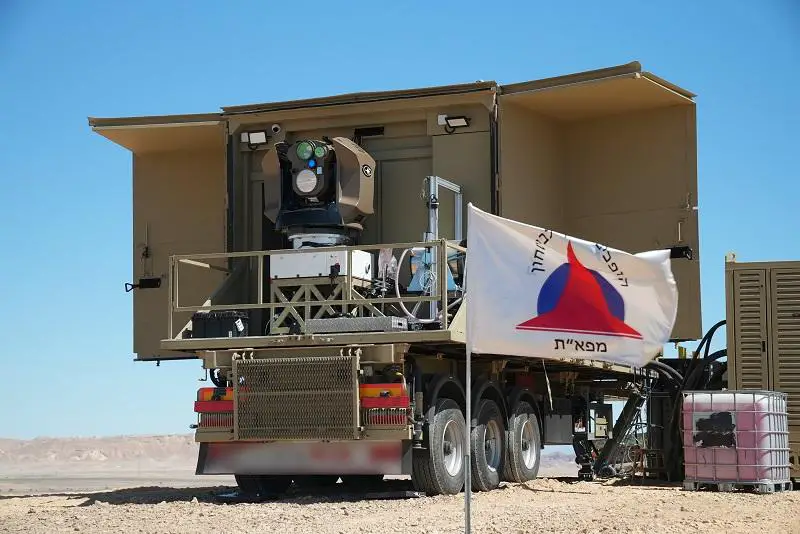The Israel Ministry of Defense has recently announced a high-value contract, estimated at over $500 million, aimed at scaling up the production of the Iron Beam laser weapon system. This landmark agreement, finalized on Sunday, brings together leading Israeli defense companies Rafael Advanced Defense Systems and Elbit Systems as the primary contractors responsible for advancing this cutting-edge defense technology. Iron Beam is expected to add a crucial layer to Israel’s existing air defense architecture, providing a high-tech and cost-effective means of intercepting various aerial threats. Iron Beam’s technology is rooted in fiber laser advancements that generate an intense laser beam capable of destroying aerial targets upon contact. This laser system can function either as a stand-alone defense unit or as part of a broader air defense network, receiving data from surveillance systems to accurately track and engage incoming threats. In practical operation, Iron Beam uses advanced tracking mechanisms to identify, target, and neutralize incoming projectiles, ensuring rapid and precise engagements. The signing ceremony, held at the Ministry of Defense headquarters in Tel Aviv, was attended by senior figures in Israel’s defense sector, including Maj. Gen. (Res.) Eyal Zamir, Director General of the Ministry of Defense, and Brig. Gen. (Ret.) Dr. Daniel Gold, who heads the Directorate of Defense Research and Development (DDR&D). The presence of Rafael’s CEO, Yoav Tourgeman, and Elbit Systems President and CEO, Bezhalel (Butzi) Machlis, highlighted the collaboration between these two major defense contractors and underscored the significance of this strategic partnership in enhancing Israel’s defense capabilities.
Iron Beam, known in Hebrew as “Ma’gen Or” or “Shield of Light,” is a directed-energy air defense system first unveiled by Rafael Advanced Defense Systems during the Singapore Airshow on February 11, 2014. Its primary function is to intercept and destroy short-range projectiles such as rockets, artillery shells, and mortar bombs. Iron Beam’s technology enables it to neutralize these threats with unprecedented speed and precision, and it is expected to be deployed by October 2025. This system boasts a range of approximately 10 kilometers (6.2 miles) and is intended to operate in tandem with the Iron Dome, which is designed to intercept threats from greater distances. Additionally, Iron Beam can intercept unmanned aerial vehicles (UAVs) at a remarkably low cost per interception, estimated between $2 and $5—significantly lower than traditional missile interceptors. With its deployment, Iron Beam will serve as the fifth component in Israel’s integrated missile defense network, joining the ranks of the Arrow 2, Arrow 3, David’s Sling, and Iron Dome. Since its initial development, the Iron Beam system has seen significant improvements in laser power. Back in 2016, reports indicated that Iron Beam’s laser power was within the “tens of kilowatts” range. However, a 2020 report estimated that Iron Beam was capable of effective engagements within a range of 7 kilometers. By 2023, further advancements had increased the system’s laser output to approximately 100 kilowatts, allowing the laser to focus on a target with pinpoint accuracy—down to the diameter of a coin—at distances of up to 10 kilometers (6.2 miles). This level of power not only enhances the system’s effectiveness but also enables it to engage a wider range of threats more efficiently.

Bezhalel (Butzi) Machlis, President and CEO of Elbit Systems, underscored the importance of this advancement: “As Israel’s global leader in high-power laser technology, Elbit Systems welcomes the significant progress in the Iron Beam project and is proud of its contribution to its success. The capabilities developed at Elbit that will be integrated into Iron Beam represent a quantum leap in future defence technology against various threats.”
Yoav Tourgeman, CEO of Rafael, expressed the company’s pride in leading the initiative: “Rafael is proud to lead the development and delivery of the Iron Beam, world’s first advanced high-power laser system for intercepting a wide range of aerial threats. After years of research, development, and significant technological breakthroughs in laser technology at Rafael, along with an extensive series of successful trials, the Iron Beam system will soon reach maturity for operational deployment.”
One of the primary advantages of the Iron Beam system and similar directed energy weapons is their relatively low operational cost compared to traditional missile-based interception systems. Unlike missile interceptors, which incur high costs per shot and rely on a limited supply of munitions, laser weapons like Iron Beam provide a virtually unlimited firing capability with minimal per-shot costs. This translates to a cost-effective solution that is ideal for countering high volumes of incoming threats without depleting resources. Additionally, the Iron Beam system requires less manpower to operate, further reducing operational expenses. Another notable benefit is the absence of interceptor debris, which enhances safety in the protected area by eliminating the risks associated with falling shrapnel or remnants from traditional interceptors. Since at least 2014, defense analysts have noted that directed energy weapons could play a vital role in Israel’s multi-layered defense strategy, addressing potential gaps in coverage and providing a versatile response to evolving threats. With Iron Beam, Israel can now counter a broader spectrum of airborne threats, from low-cost rockets and mortar shells to sophisticated UAVs, at a fraction of the cost and with greater operational efficiency. The integration of Iron Beam into Israel’s defensive infrastructure marks a significant milestone, as it enhances the country’s ability to address both current and emerging threats. This addition to Israel’s defense arsenal not only reinforces the existing Iron Dome and David’s Sling systems but also establishes a more sustainable and robust approach to air defense.













